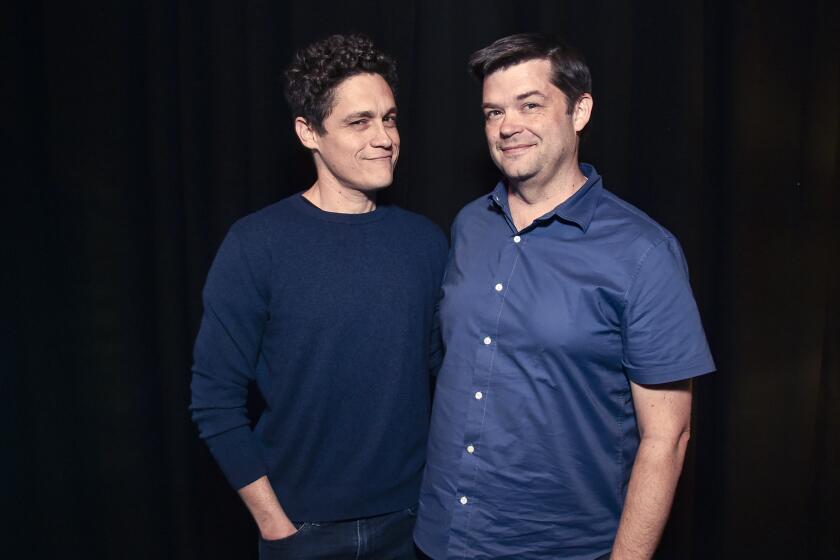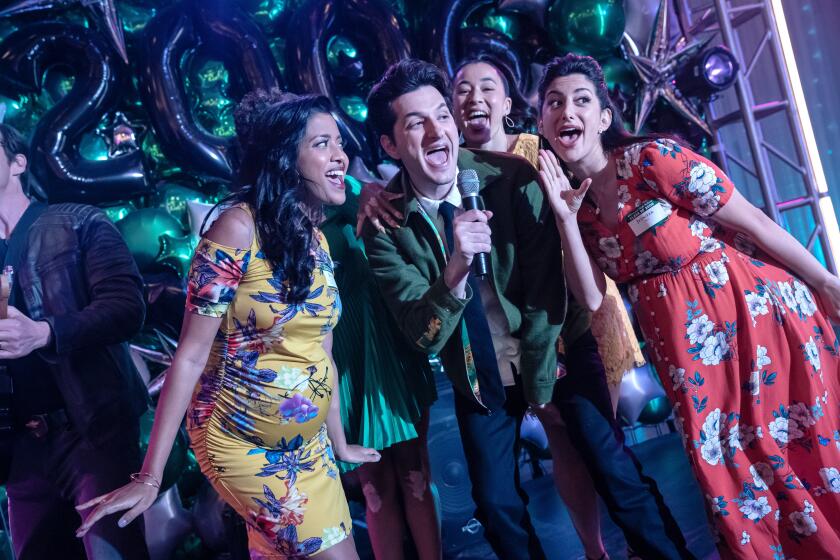‘The Afterparty’ finale: The show’s leaders discuss the clues that reveal the killer in Season 2
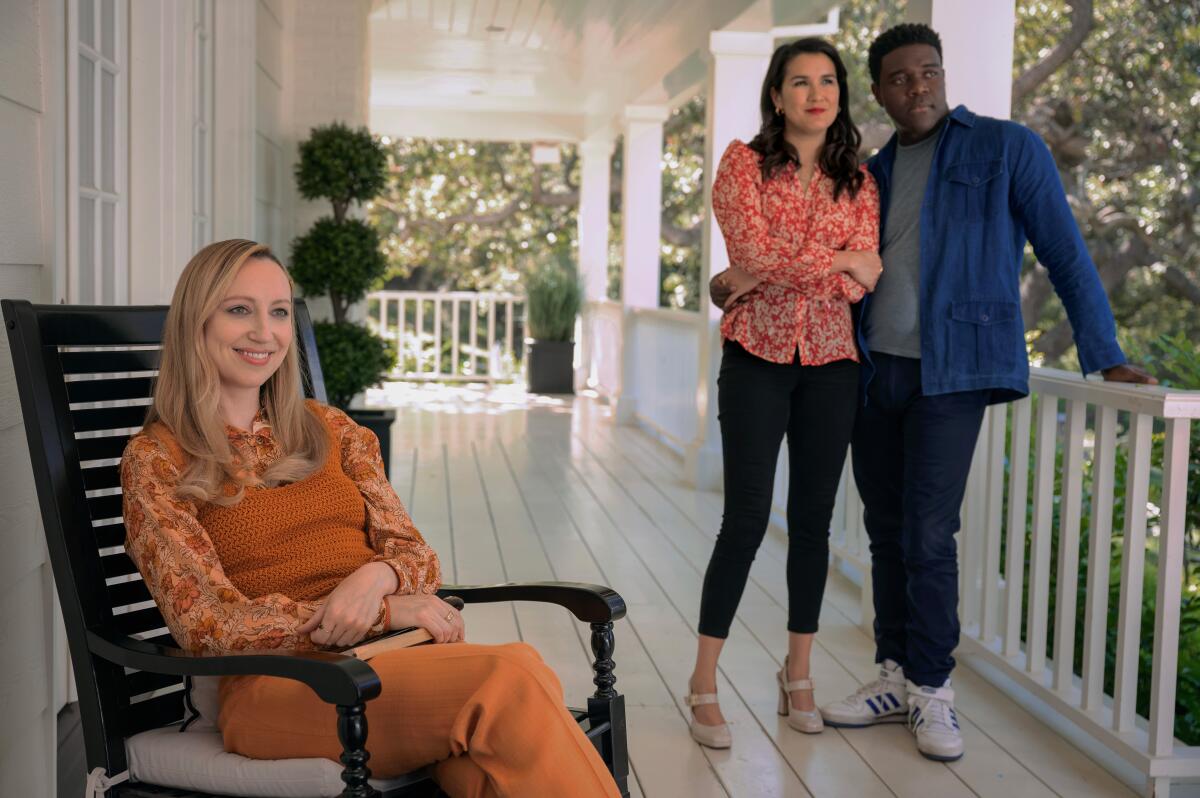
This article contains spoilers for the Season 2 finale of “The Afterparty.”
The second season of the Apple TV+ comedy “The Afterparty,” a murder-mystery anthology centering on the potentially culpable party guests of a recently deceased host, had so many twists and turns that even the actual killing itself was a red herring: Instead of what seemed to be an act of mariticide, it was a botched attempt at fratricide.
The show’s gimmick is that each episode isn’t just about a suspect, it also references a specific genre of filmmaking. In the first season, Aniq (Sam Richardson) and Zoë (Zoë Chao) survive the afterparty of their high school reunion physically unscathed. This year, they’re happily in love and attending the nuptials of Grace (Poppy Liu), Zoë’s sister, to the old moneyed finance bro Edgar (Zach Woods). After sipping a tainted drink at the wedding’s afterparty, neither the groom nor his pet lizard, Roxana, survive the wedding night. So Zoë and Aniq call in the one cop they know — now-retired Detective Danner (played by Tiffany Haddish) — to help acquit Grace.
Their plan works, but it comes with some familial heartbreak: The murderer is Zoë and Grace’s “funcle” Ulysses (John Cho), who planted the poisoned drink not to kill Edgar but to take down his half-brother Feng (Ken Jeong). His motive? He had a passionate affair with the sisters’ mom Vivian (Vivian Wu) and was devastated to learn that she had moved on and chose her husband.
The format for “The Afterparty” allows for each season to have a different set of tropes to (lovingly) mock with a different troupe of actors. But some things have been repeated. For example, this is the second time the show made its antagonist someone with a theatrical background. This season, Ulysses is a dancer; in the first season, Ben Schwartz’s jealous and vengeful Yasper dreamed of having a successful music career like his old high school bandmate Xavier (Dave Franco).
The show’s creator Chris Miller, his co-showrunner Anthony King, and their fellow executive producer Phil Lord insist that any beef with performers who are triple threats is mere coincidence. The trio spoke with The Times about aligning the puzzle pieces for Season 2. This interview has been edited and condensed for clarity.
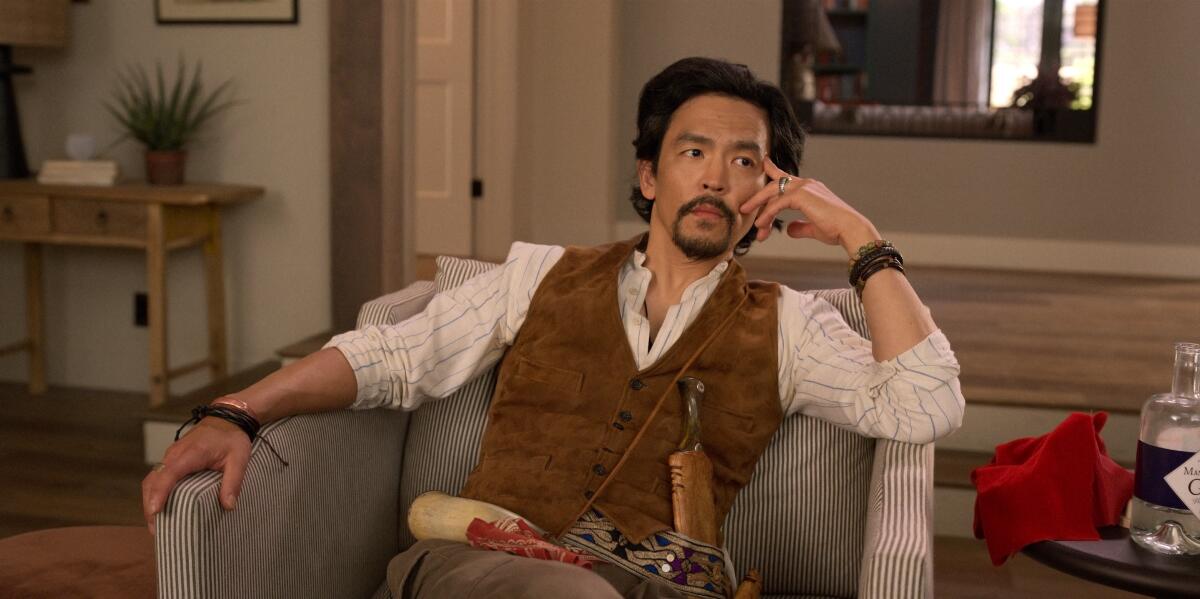
This is the second time you’ve cast an actor known for playing charismatic and likable characters as your murderer. Is that part of what makes this show’s formula work?
Miller: Both of them just ooze their kindness out of their pores. Even when they play characters who are jerks, you can tell that they’re not actually, on a cellular level, a bad person. So I think that part of throwing people off the scent is casting somebody who doesn’t seem suspicious with every glance that they make.
And it’s also fun for a really nice person to get to play a really bad person all the time. It was true about Dave Franco in the first season. He often plays jerks. But there are few people kinder than him as a human being.
King: What we didn’t know about John is that there is literally nothing we could throw at him that he couldn’t do. We were just like, “Can you sing?” and he was like, “Kind of.” And then it was just, like, knocked that out of the park. And then we’re like, “Can you ride a horse?” He’s like, “Can I have one lesson?” and then he’s riding a horse. “Bareback?” He’s like “probably.” I mean, just every single day. “Can you dance?” I mean, it was insane.
Chris Miller and Phil Lord, creators of the murder-mystery comedy series, thought doing eight perspectives on a parlor mystery sounded like fun. Oh, and each one would be in a different genre.
On that: Episodes usually focus on one character attempting to prove their innocence to investigators. The episodes tend to be homages to different directors or art forms while also suggesting how the character might see themselves, such as this season when the standalone episode for Anna Konkle’s Hannah — Edgar’s quirky, adopted sister — was styled like a Wes Anderson movie. Ulysses’ stand-alone episode, in which we learn about his past affair with Vivian and in which he takes his pain of losing her out via dance while wearing a white shirt and tight black pants in the rain, doesn’t seem to have as clear a theme.
Miller: The idea for that one was this is a movie that is thirsty to win Oscars. It was one of those movies that is trying really hard to be melodramatic and self-important and just going for it in every department. [There were references to] various epic romances throughout the years. But, basically, the guiding principle was everybody in this is just so thirsty to win awards.
You teased in the finale that the killer might have been Zoë because she was gone for much of the wedding’s afterparty and because she tampered with evidence like Yasper did in Season 1. Was there ever talk of making her the killer?
King: Because in the first season Aniq’s friend was the one who was the murderer, there were some people who were going, “Wouldn’t it be pretty wild if Aniq’s girlfriend was the murderer?” So it was already in the air. And we knew that wasn’t where we wanted to go.
But because we were also playing with how bringing [Zoë’s] family into it divides them and makes it a challenge for their relationship, it did feel like it was satisfying to even go there for just a small amount of time to explore if Aniq can really suspect Zoë. And, of course, he doesn’t really think she did. But the shock that she did throw a dog out the window just seemed like a fun place to go.
Miller: You’re always trying to have characters do things that are suspicious or make you ask questions. When you’re trying to figure out how to weave all the characters throughout the story, you want to suspect and not suspect everyone at a certain point. So part of the fun is giving the character something to do so we’re like, “What are they doing? What’s she doing? What’s she doing there?”
In both seasons, you worked with magician David Kwong to hide clues in costumes, sets and props. This season was particularly intense with anagrams hidden in board games and other places. How do you do that without getting too gimmicky?
King: When we’re in the room, we are constantly trying to both give clues and also we’re going well, but if you give that clue, smart people are going to go, “Well, they want you to think that that’s a clue.” People aren’t going to think it’s cool. We’re constantly second-guessing ourselves and trying to put ourselves in the audience’s point-of-view.
But at the same time, there’s also looking for these places to put the actual puzzles that are hidden in the show. And David is a big part of figuring out what the puzzles can be and, also, how we can hide them so they’re not distracting, but anyone who wants to find them can notice that that was a strange shot [and go] “I wonder why they put that in there? Oh, it’s because there’s Braille food on someone’s chest.”
Lord: There’s a meta narrative alongside the whole thing, which I think is part of the playfulness of the whole show. The show knows you’re watching it. And it’s acknowledging that and is enjoying letting you play along.
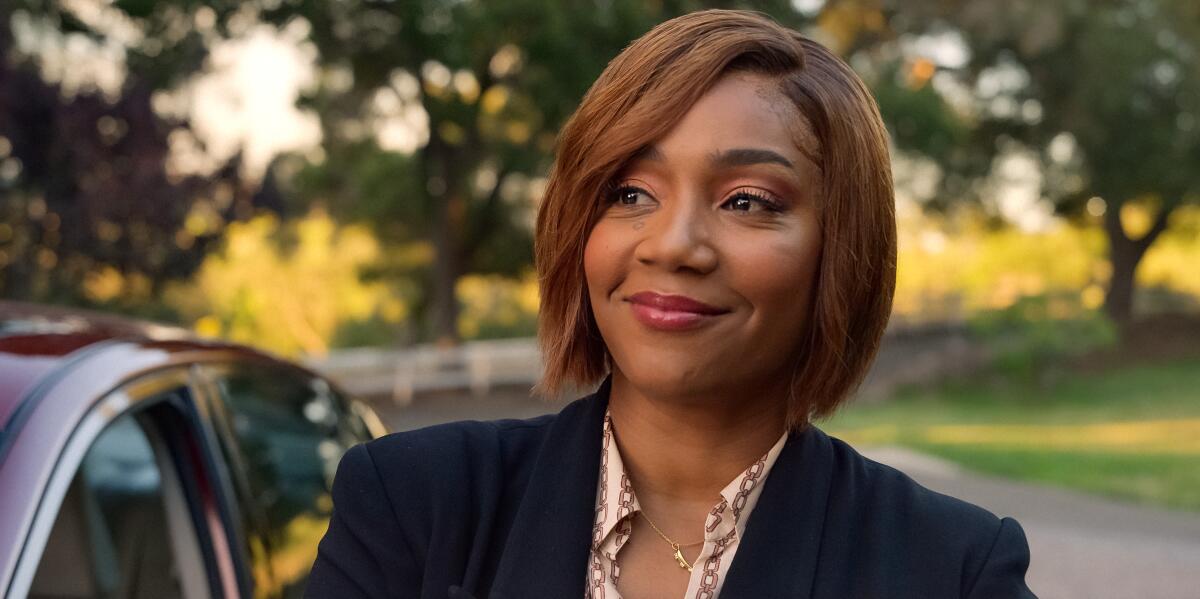
How does this playfulness affect casting? It seems like a cart-before-the-horse situation where you may have to get an actor on board and then build a character around them.
Miller: We definitely start with the character. But then, as we’re molding the character, we have someone in mind. Luckily, we’ve been able to get most of the people that we’ve had in mind from the beginning. So the characters feel like they’re supposed to be them because they’re written with them in mind. And … [the actors] have to be funny. They have to be able to do comedy. And, on top of that, they have to be able to have the breadth of skill to play 10 different genres in a way that feels convincing and not like a “Saturday Night Live” sketch.
But the Season 2 finale took this a step further because we see that Haddish’s Danner is making a movie about the Season 1 case. Like the “Black Mirror” episode “Joan Is Awful,” you have even more famous people playing characters based on the characters your cast, who are themselves established stars, played in the first season. You cast Jaleel White as that version of Aniq because we know Danner had a crush on his “Family Matters” character, Steve Urkel. But how did you figure out who else to cast?
Tiffany Haddish kills — well, not literally — in Apple’s high-school-reunion ‘Rashomon,’ combining the cast’s comic chops with a compelling whodunit.
Miller: The real trick was not getting the people but actually figuring out how to shoot them all. We were trying, at first, to shoot them all on set together. But Gemma [Chan, who plays a version of Zoë] lives in London and everybody’s schedules were crazy. We ended up shooting them all individually at separate times and separate days, which was a little bit nutty. But that was a real challenge more than finding the right people to do it because it was a fun thought experiment of, “If we were making a movie of the first murderer, who would play all these characters?”
King: It was also funny the day Elijah Wood [who played the movie version of Yasper] came in. We had him in front of a green screen and he was just immediately so good at it. And it was like, oh, yeah, you spent five years of your life acting against the green screen in “The Lord of the Rings.” He was a total pro.
The show loves wordplay and this season’s death involves a fatal flower. Is the character of Ulysses named as a reference to the James Joyce novel of the same name, where the main character is named Leopold Bloom? Or maybe Homer’s “The Odyssey” which also has magical flowers?
Miller: We name the characters by alphabet — in the first season it was ABCDWXYZ (Aniq, Brett, Chelsea, etc.). This season we were using STUV (Sebastian, Travis, etc.) and we needed a “U.” Ulysses [in both versions] is a man who tells somewhat fabulist tales of his epic travels, so it seemed appropriate for the character — more the Odysseus version than the Joyce version. But the Joyce version was making an epic of an ordinary life, so that was kind of appropriate too.
There’s also a lot of animal humor this season. In addition to the dearly departed Roxana, there’s a dog who won’t die, an actual horse and a horse’s name that could be a clue.
Miller: We are constantly writing animal stuff. It seems very funny to all three of us. We’re always putting animal stuff in even though it’s one of the hardest things to produce. It’s such a pain in the ass to have a horse on a soundstage and it’s not easy to have a lizard on someone’s shoulder. We have four lizards that we were rotating through. We’re gluttons for punishment, I guess. Jokes involving animals really tickle us. But then it really does the opposite of tickling to all of the line producers and crew members to figure out how we’re going to shoot it.
The show hasn’t been renewed for a third season yet and the WGA strike means you can’t plot one out. But, have you thought about a third season? And, if so, would you want to parody yourselves?
Miller: Like an ouroboros? It’s the final episode and they all just disappear. [laughs]
We have definitely thought about other genres and we have a bunch of really fun ideas. You would think that we would run out, but there’s actually a lot more left.
What do you think of our trend of murder mystery shows and movies like this, the “Knives Out” movies and the Hulu series “Only Murders in the Building” and the upcoming “A Murder at the End of the World,” that make fun of the murder mystery genre?
King: I feel like the world is so chaotic and the theme of a murder mystery is there is an answer and there is order in the world that can be solved. I think they’re very comforting, right now especially.
More to Read
The complete guide to home viewing
Get Screen Gab for everything about the TV shows and streaming movies everyone’s talking about.
You may occasionally receive promotional content from the Los Angeles Times.
